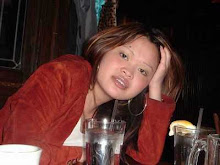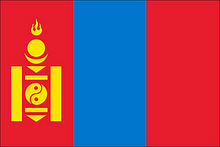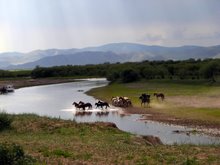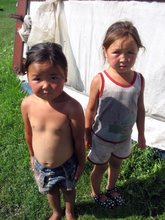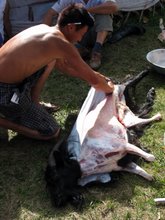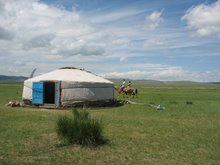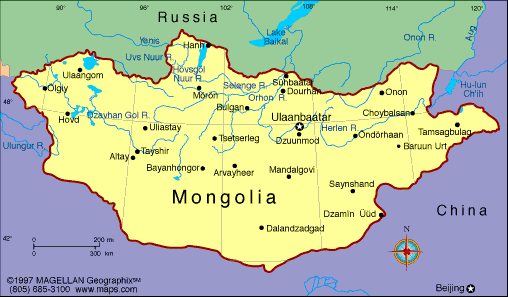Burengiin Nuruu Mountain Range

History of the Peace Corps Program in Mongolia
Country Assignment
- Country: Mongolia (Outter)
- Program: Youth Development
- Job Title: Life Skills Trainer (also: English teacher, Child Caretaker, Fund Raiser, Events Organizer, and IT Trainer)
- Orientation (Staging in Atlanta, GA): May 31-June 2, 2007
- Pre-Service Training (in Darkhan and Sukhbaatar, Mongolia): June 3-August 18, 2007
- Dates of Service (in Darkhan at Sun Children formerly "Asian Child Foundation" - a non-profit, non-government Japanese funded orphanage of 37 Mongolian children opened since 8/25/2005): August 19, 2007- August 18, 2009
Location and Nature of the Job
CYD Volunteers are placed in provincial centers with population between 15,000 and 70,000. A few CYD Volunteers are placed in Ulaanbaatar, where the population is reaching 1 million. I will work with youth-focused NGOs, children’s centers, schools, and civil society organizations to address major challenges confronting Mongolian youth today, such as education, life skills, employability, and leadership. In addition, the work will involve workshops and presentations at schools and community agencies and will entail traveling to other outlying communities that have less access to information and training. Given the vast distances in Mongolia, these visits will often require overnight stays.
Saturday, August 18, 2007
After Swearing In, Moving-In
Wednesday, August 8, 2007
Goodbye to Sukhbaatar, Goodbye My Host Community
On another note, PST is over; the final LPIs (Language Proficiency Interviews) were given on Monday. I’ve gotten better in the language department; I learned enough “filler” words (i.e. then, and, because, but) to make full meaningful sentences instead of the kidde babble that I was spewing the first three weeks in-country. Although I will greatly miss living with my Mongolian host family (and being pampered and cared for), I am more than ready to be on my own and begin my service. PST is similar to experiencing high school all over again: cliques are formed, gossip is spread, bickering and complaining fluctuates with the heat, handwritten notes are passed, and alcohol debauchery is in fill swing. And, like high school, it is memorable but not an experience one wants to repeat.
As an aide memoire to my host community of Sukhbaatar, I have attached some surrounding landscape pictures. A fellow PCT once described Sukhbaatar as:
“…2 paved roads and zero stoplights. There is an outdoor market attached to an indoor butcher and vegetable vendor. The butcher shop has meat out on counter tops, not refrigerated. Also, most of the butchering is done before your eyes. Cows freely roam around the grassy borders of the city square, and it is more common to see a man riding a horse around town than driving a car. The bars have people passed out in booths or on the bar at any hour of the day, and it is rare to see any kind of law enforcement or police.”
Salomon is correct in his first impressions, though, his first impressions overlook the underline charm that indeed exists within this town. In truth, it took me several weeks to notice it myself. It is in the lady who sells Russian ice cream at the market, the outdoor café that keeps Pringos on hand and blasts popular American music, the colorful jungle gyms that are randomly placed throughout town, the individually owned delguurs unique as the collection of foreign and local items they sell, the man holes without covers (for they have all be stolen to be melted and sold in China), and the occasional cow that freely roams untended. It is the little things that one notices when the first impressions fade away. It is the difference between a traveler and a resident…
I leave you with pictures.





Saturday, August 4, 2007
The Cultural Gift of a Del, Made With a Mother’s Loving Hands
A brief interruption for a cultural explanation:
A del is the Mongol’s traditional garment worn on both workdays and special days. It is a long, loose gown cut one piece with the sleeves; it has a high collar and widely overlaps at the front. The del is girdled with a sash. Each ethnic group living in Mongolia has its own del distinguished by cut, color, and trimming. With the increase in European dress, especially with the women, the del has evolved to adapt to the frequent demands of the latest fashion, ranging in colors and choice of fabric as well as in the elegance of the cut and originality of the trimmings.
As I was saying, my host mother has been sewing my del on an old-fashion portable sewing machine that she hand-cranks with her right hand while pushing the material to be sewn (without the help of pins) with her left. I am amazed at how she manages to create perfect straight lines and design a dress pattern that fits flawlessly without the help of a measuring tape.
Watching her work, I am greatly reminded of my biological mother. My Mongolian host mother greatly resembles my Vietnamese biological mother. They both have a penchant for bubble gum colored lipstick. They both are masters at sewing, even owning similar old-fashion black sewing machines adorned with hand-painted flowers. Even their kisses are the same; the tender ‘sniff’ of the nose to the receiver’s cheek – a trait I had previously only associated to Vietnamese culture but now realized existed elsewhere; its origin remain unknown.
I am excited to wear the finish product, an honor I will save for my swearing-in ceremony in UB. Then, I will not only look the part of a Mongolian but I will feel like one too.

Thursday, August 2, 2007
Adjustments and First Impressions
1. Like it in Mongolia; been to the countryside or on a horse: yes, twice, and yes (getting better at holding on when they start to gallop unexpectedly).
2. First Impressions: too many to list them all but some are: (1) the sun is like the presence of God, shinning with intensity until 10pm; (2) there is a lack of trees and shade in general, coupled with impression #1 makes for a very hot summer; (3) Mongolians have a problem with littering; (4) with the lack of a public transportation system and paved roads, hitching is very common; (5) most Mongolians identify themselves as Buddhist but don’t actively practice.
3. Hardest to adjust to: frequent unexpected power surges that last for hours at a time and swatting to pee and poop, esp. those LONG poop sessions outside in pit toilets…I am NOT looking forward to such sessions during the upcoming winter.
4. How deep do the hole on those pit toilets go: depends on the ‘newness’ of the hole, if it was recently dug (then it would be about 10-15ft) or almost full (3-5ft). The only restrictions are: (1) must be located 20ft from the house, and (2) at least 20ft away from a natural water source.
5. Miss the most: paved roads and the feeling of riding on asphalt, indoor plumbing, and the cushions of a toilet seat.
6. Packing the right things: between the advice on packing from the current M17 group in the Mongolia Welcoming Book and my natural instincts, I did pretty well with the packing. However, I did pack for ger living (when in doubt, pack for the worse) but alas, it turns out that I most likely will be living in a heated, indoor plumbing, apartment in an aimag center (aka: providence capital). There goes the extra sleeping bag, solar shower bag, and endless supply of baby wipes.
Recommended Books on Mongolia
- “Dateline: An American Journalist in Nomad’s Land” by Michael Kohn, 2006.
- "Ghengis Khan and the Making of the Modern World” by Jack Weatherford, 2004.
- “Riding Windhorses” by Sarangerel, 2000.
- “Twentieth Century Mongolia” by Baabar, 1999.
Recommended Mongolian Movies
- The Story of the Weeping Camel (2004), Die Geschichte vom Weinenden Kamel
- Mongolian Ping Pong (2005), Lü cao di
Notable Articles on Mongolia
Informational Links
- Peace Corps - Mongolia
- International Calling Card (Cheap!)
- Current Mongolian News
- Current Weather Conditions in Ulannbaatar, Mongolia
- A Tour of Mongolia Through Photography
- History of Mongolia
- Mongolian Culture
- Mongolian Lanuage
- Weather and Climate In Mongolia
- Travel Guide to Mongolia
- Official Tourism Website of Mongolia
- Asia.com - Cheapest Airfare to Asia
- MIAT - Mongolian Airlines
- Currency Converter
- Entry and Visa Requirements





